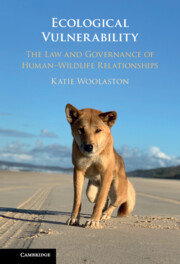Book contents
- Ecological Vulnerability
- Ecological Vulnerability
- Copyright page
- Contents
- Abbreviations
- 1 Introduction
- 2 The Human–Wildlife Relationship
- 3 Friends in the Wild?
- 4 Friends in Law?
- 5 Human–Dingo Conflict on K’gari (Fraser) Island
- 6 Human–Elephant Conflict in Northern Botswana
- 7 Pandemic Vulnerability and Resilience
- 8 Conclusion
- Index
7 - Pandemic Vulnerability and Resilience
Wildlife and COVID-19
Published online by Cambridge University Press: 09 June 2022
- Ecological Vulnerability
- Ecological Vulnerability
- Copyright page
- Contents
- Abbreviations
- 1 Introduction
- 2 The Human–Wildlife Relationship
- 3 Friends in the Wild?
- 4 Friends in Law?
- 5 Human–Dingo Conflict on K’gari (Fraser) Island
- 6 Human–Elephant Conflict in Northern Botswana
- 7 Pandemic Vulnerability and Resilience
- 8 Conclusion
- Index
Summary
Chapter 7 provides a comprehensive study of the legal and illegal trade in wildlife and the resulting consequences, namely pandemics such as COVID-19. At no time in recent history have we seen the effect of our use and abuse of wildlife in such a direct, immediate, and catastrophic way as we have with COVID-19. In reality, a pandemic such as this could have originated anywhere in the world because governance at global and local levels does not adequately respond to the vulnerability that humanity shares with the environment. Also, the use and abuse of wildlife is a worldwide phenomenon. Specifically, and despite the Chinese origins of the pandemic, international and domestic wildlife and environmental laws continue to allow for the same exploitation that resulted in the initial disease transmission. This chapter analyses this proposition from an eco-vulnerability point of view with emphasis on gaps in international wildlife governance and missing institutional collaboration opportunities. It considers the larger failings of environmental governance considering this pandemic and suggests ways of moving forward.
Keywords
- Type
- Chapter
- Information
- Ecological VulnerabilityThe Law and Governance of Human–Wildlife Relationships, pp. 195 - 215Publisher: Cambridge University PressPrint publication year: 2022



